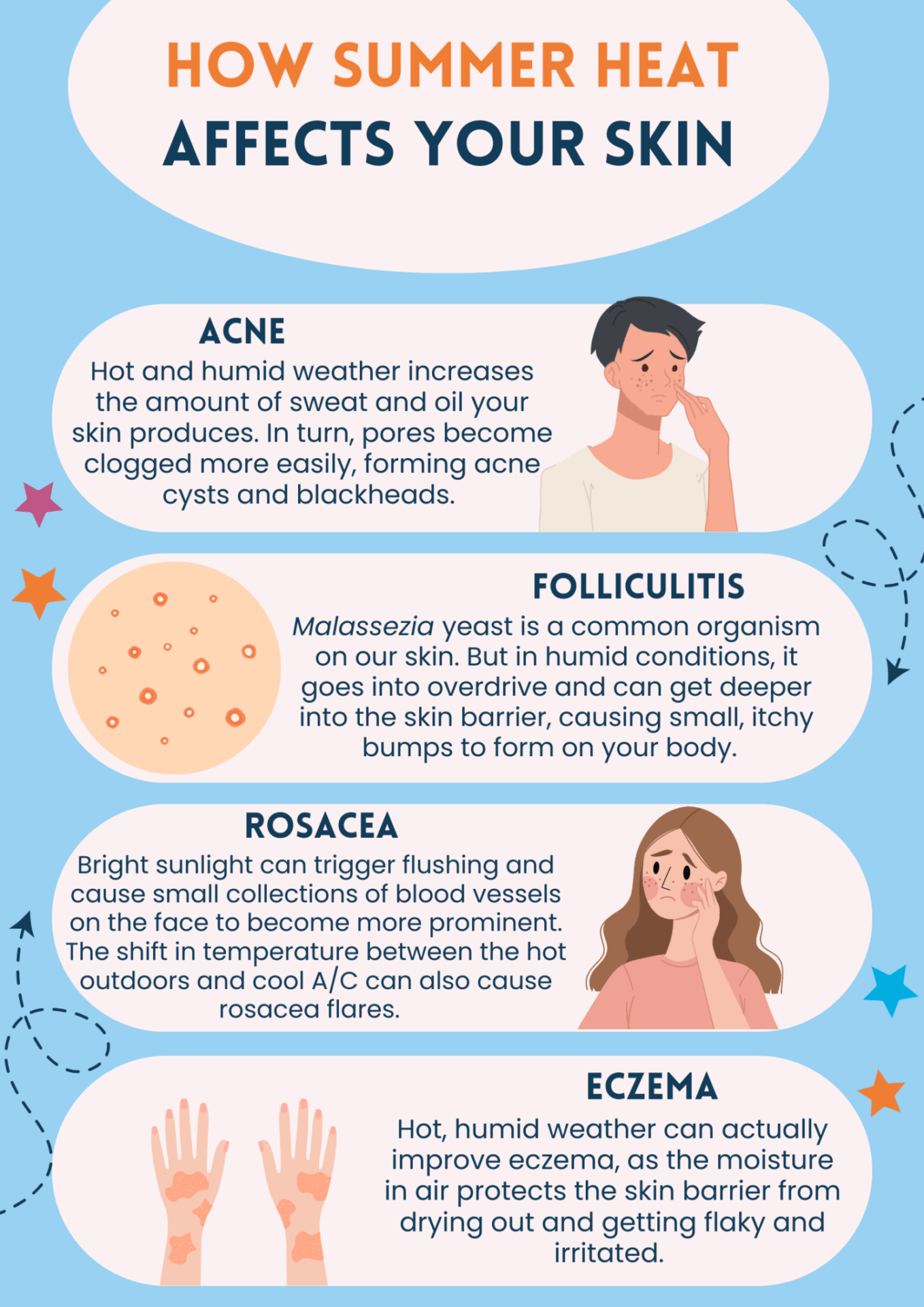This post may contain affiliate links which means Brenda Dintiman may receive a commission from purchases made through links. Brenda Dintiman will only recommend products that she has personally used. Learn more here: Privacy Policy
Although the end of summer is quickly approaching, we are experiencing some of the hottest and most humid weather of the year here in Virginia, and we can look forward to 80+ degree days until well into September. Even as we trade sunbathing for studying and bug bites for school books, the bright sunshine and high heat will continue to have an effect on our bodies. Here are some common summer effects on skin conditions:

Acne
Acne is a condition caused by the buildup of oil and bacteria within clogged pores, which leads to inflamed and sometimes painful bumps. In summer weather, the sebaceous glands of your skin produce more oil, and sweat that evaporates from your skin leaves behind traces of grime that can cause your pores to clog more easily. Regular face washing and gentle chemical exfoliants like salicylic acid can help prevent clogged pores. A dermatologist can help you find the right medications to manage the oil production of your skin and the inflammation which causes acne bumps to form.
Folliculitis
Folliculitis is caused by the overgrowth of Malassezia yeast which irritates the skin and causes small, often itchy bumps to form. It is also called “fungal acne”. Although Malassezia is a normal and typically harmless part of our skin’s microbiome, high heat and trapped moisture in the summer make for an irritating skin condition. Wearing loose, breathable clothes, changing out of exercise clothes and swimsuits quickly, and using appropriate anti-yeast medications helps tame folliculitis.
Rosacea
Rosacea is characterized by redness, flushing, and the formation of small blood vessels near the surface of the skin. Summer skin damage from bright sunlight can make small blood vessels more prominent. Sudden temperature changes, like exiting an air-conditioned building after walking through the hot outdoors, also trigger flushing and redness. Tinted mineral sunscreen helps protect the skin from both the damaging effects of bright sunlight and the flushing it triggers, while topical and oral medications can minimize the redness rosacea causes.
Eczema
Eczema is a red, itchy skin condition that is caused when the protective outer layer of the skin- the skin barrier- is disrupted. However, many people who suffer from eczema find relief in the warmer, more humid summer months! The moisture in the air prevents the skin barrier from drying out and getting irritated. Regular use of moisturizers also helps protect the skin barrier, while topical medications such as steroid creams help minimize the itching and inflammation associated with eczema.
If you want to get personalized evaluation, advice, and treatment for your skin, please contact our office to make an appointment today. We offer both in-person and online appointments for acne, eczema, psoriasis, rosacea, and more. You can call our office at (703) 229-2544 or contact us through the widget on our website.
Sources
- Saunte DML, Gaitanis G, Hay RJ. Malassezia-Associated Skin Diseases, the Use of Diagnostics and Treatment. Front Cell Infect Microbiol. 2020;10:112. Published 2020 Mar 20. doi:10.3389/fcimb.2020.00112
- Narang I, Sardana K, Bajpai R, Garg VK. Seasonal aggravation of acne in summers and the effect of temperature and humidity in a study in a tropical setting. J Cosmet Dermatol. 2019;18(4):1098-1104. doi:10.1111/jocd.12777
- Morgado-Carrasco D, Granger C, Trullas C, Piquero-Casals J. Impact of ultraviolet radiation and exposome on rosacea: Key role of photoprotection in optimizing treatment. J Cosmet Dermatol. 2021 Nov;20(11):3415-3421. doi: 10.1111/jocd.14020. Epub 2021 Mar 4. PMID: 33626227; PMCID: PMC8596706.
- He A, Grandhi R, Kwatra SG. Rosacea and Rate of Temperature Change: Examining Real-Time Data from 2004 to 2016. Ann Dermatol. 2018;30(6):739-741. doi:10.5021/ad.2018.30.6.739
- Chan J, MacNeill SJ, Stuart B, et al. Do temperature changes cause eczema flares? An English cohort study [published online ahead of print, 2023 May 2]. Clin Exp Dermatol. 2023;llad147. doi:10.1093/ced/llad147
